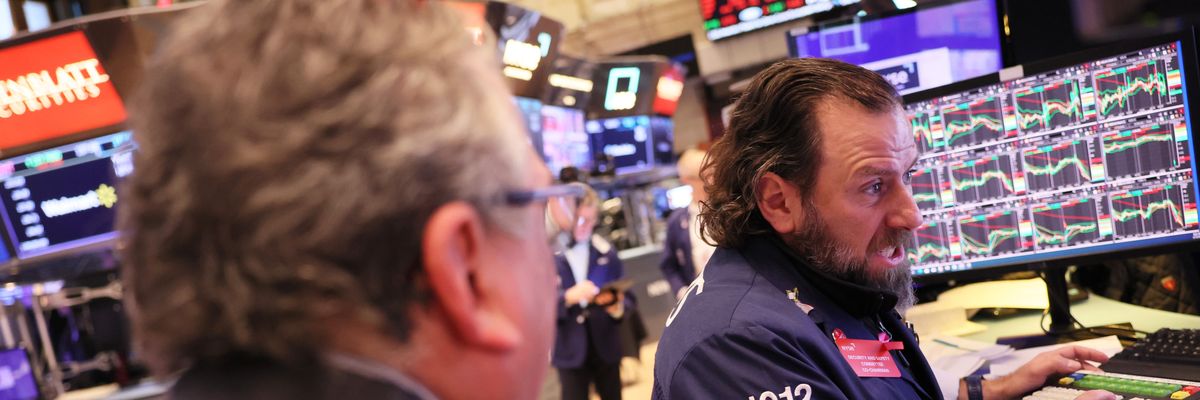A vanishingly short period of relief in U.S. and global markets was shattered Wednesday after the scandal-plagued Swiss banking giant Credit Suisse announced that its auditor identified "material weakness" in its financial reporting and the firm's largest investor—the Saudi National Bank—said it wouldn't inject more cash to bolster the company.
As its share price plunged, Credit Suisse intensified concerns about its financial health—and broader alarm about the stability of global markets—by pleading with the Swiss National Bank and the regulator Finma to issue public statements of support for the lender, which controlled roughly $580 billion in assets at the end of last year.
"The bank said it is working to address the problems [with its financial reporting], which 'could require us to expend significant resources,'" The Washington Postreported Wednesday. "It cautioned that the troubles could ultimately impact the bank's access to capital markets and subject it to 'potential regulatory investigations and sanctions.'"
The fresh crisis at Credit Suisse, which comes just days after two U.S. banks collapsed, compounded fears that seemingly isolated problems at individual financial institutions could signal a deeper systemic threat with far-reaching implications for the interconnected global economy.
"This is scary—financial markets are now betting on Credit Suisse failing—and no one can pretend there will not be a fallout from that," Richard Murphy, a professor of accounting practice at Sheffield University Management School in the U.K., wrote Wednesday, pointing to the soaring price of the bank's five-year credit default swaps, which prompted flashbacks to the 2008 global financial crisis.
"Is this the next financial crisis unfolding? It feels like it may be—and all because of reckless increases in interest rates by central banks," Murphy added.
Experts and analysts have argued that—along with years of deregulation—the U.S. Federal Reserve's rapid interest rate hikes contributed to the fall of California-based Silicon Valley Bank (SVB), which sold its bond portfolio at a major loss last week after it declined in value due to the Fed's actions.
While U.S. lawmakers have lambasted SVB for poor risk management, the firm was hardly alone in taking on large bond holdings when interest rates were low only to watch them lose value precipitously as central banks jacked up rates to combat high inflation.
"Investors said Credit Suisse's problems were a reminder that Europe's banks also had large holdings of bonds that had been hammered by rising interest rates," the Financial Timesreported.
As The American Prospect's David Dayen put it Wednesday, "As long as interest rates keep rising, more banks will be exposed."
"Credit Suisse is in principle a much bigger concern for the global economy than the regional U.S. banks which were in the firing line last week."
Just a week ago, it appeared that Fed Chair Jerome Powell was bent on continuing to raise interest rates even amid mounting warnings about the potentially devastating impacts on millions of workers whose wages and jobs are on the line.
But faced with growing panic in the financial sector, Powell is now widely expected to step on the brakes—at least temporarily—at the Fed's policy meeting next week. Powell is himself a former investment banker, and Wall Street lobbies the Fed on a range of issues.
Reutersreported Wednesday that "expectations for the U.S. central bank's next move have swung wildly in recent days, after the sudden failure of two regional banks late last week triggered alarm about the health of the banking system and raised doubts about how much further the Fed may take what has been an aggressive fight against stubbornly high inflation."
Turmoil at Credit Suisse, which insists its balance sheet is "strong," will likely cement the case against further Fed rate hikes in the near future, analysts suggested.
The Treasury Department is reportedly monitoring news at Credit Suisse, whose U.S. arm is overseen by the Fed.
"Credit Suisse is in principle a much bigger concern for the global economy than the regional U.S. banks which were in the firing line last week," Andrew Kenningham, chief Europe economist with Capital Economics, wrote in a research note on Wednesday. "Credit Suisse is not just a Swiss problem but a global one."
